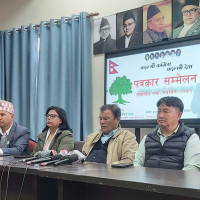- Sunday, 15 February 2026
Use Of Artificial Intelligence In Healthcare
There has been a rapid rise in the use of artificial intelligence (AI) in every sphere of our lives, and it has brought a wave of innovation as well. Its use in healthcare, from diagnostics to patient management, has shown a reduction in inefficiencies and an improvement in patient management, thereby raising the overall quality of healthcare delivery. Integration of AI has been rapid in developed nations, while developing nations have yet to benefit from its use. Owing to limited resources, healthcare manpower shortages, and weak infrastructures, developing economies face unique challenges in integrating AI in the healthcare system.
Basically, AI uses advanced algorithms and machine learning models to simulate human intelligence in decision-making, pattern recognition, and problem-solving. It has broad applications in the health care system, ranging from imaging analysis, diagnostics to individualised treatment recommendations, besides improvement in administrative efficiency. As the health care system is overstretched and mostly underfunded in developing countries, AI offers several benefits and opportunities.
AI-powered diagnostic tools
Diseases such as tuberculosis, malaria, and NCDs can be screened at an earlier stage with the help of AI-powered diagnostic tools. It can enable rural health posts to screen different diseases without expensive equipment or specialists. AI-based chatbots and clinical decision support systems can help frontline health workers provide much-needed guidance that ultimately reduces the need for specialists and costs.
AI can process vast amounts of data in a relatively short period to predict disease outbreaks, disease patterns, and suggest appropriate public health interventions. The integration of AI into telehealth platforms enhances accuracy in diagnosis, patient management, and can be life-saving for rural people where geographical barriers prohibit them from getting care in emergencies.
Although there is a tremendous benefit in integrating AI in health care, several barriers stand in the way of its implementation in developing countries. There are several requirements for the use of AI that range from uninterrupted electricity supply to reliable internet connectivity to a digital record-keeping system. Therefore, it is necessary to have all such foundational requirements to utilise the benefits of AI.
Medical records do exist in developing countries; however, they are mostly incomplete, inconsistent, and the digitalisation process is often sluggish. The use of AI depends on high-quality datasets, and importing them from developed countries may not be appropriate, as there are significant differences in disease patterns, genetic diversity, and social determinants. However, initial investment in technology, infrastructure, and training limits its use in developing countries. Without proper planning, a donor-funded pilot initiative fails once funding ceases.
Although AI tools can be cost-effective in the long run, the upfront investments in technology, infrastructure, and training can be prohibitive. In many developing economies, there are no legal frameworks to regulate the use of AI in health care. Many issues range from patient privacy, consent to accountability in the use of AI. Hence, appropriate policies and frameworks are needed before the use of AI in health care.
Health care is a relatively personal matter, and trust in AI technology may not be universally accepted in the beginning, particularly in developing countries. A fear of job loss, mistrust of machines, and a lack of familiarity with digital systems are barriers that create resistance from both patients and health workers. Hence, increasing digital literacy and demonstrating its benefits can enhance its acceptance.
It is essential to adopt context-specific, equitable, and sustainable AI systems in developing countries. The first and most important is to strengthen the digital infrastructure that includes uninterrupted electricity, reliable internet, and cloud systems. The government should consider public public-private partnership in these endeavours. It is recommended to initiate digitalisation of medical records, standardise reporting systems, and encourage data sharing across hospitals.
The training of local healthcare manpower becomes paramount before importing AI tools. Increasing digital literacy by training health professionals, data scientists, and policymakers will help them make informed choices and reduce dependence on foreign technology providers. Similarly, clear legal frameworks are required for safeguarding patients’ rights, privacy, and accountability. Therefore, it is suggested to adopt already existing guidelines incorporating local realities.
Benefits
It is also recommended to initiate pilot programmes in priority areas such as tuberculosis detection, NCDs screening, or maternal health. Successful pilot programmes can be gradually scaled up with the incorporation of local realities. There should be a comprehensive initiative to train and involve all stakeholders, from patients, health workers, to policymakers. It should be demonstrated that AI tools are for support, not to replace healthcare manpower, to reduce fear and increase confidence.
The use of AI in health care settings in developing countries brings both remarkable benefits and daunting challenges. It can offer potential benefits in solving issues such as healthcare manpower shortages, delayed diagnosis, and inequitable access, but can also create technological dependencies and exacerbate existing inequalities. Hence, careful planning, prudent investments, and ethical safeguarding are essential in the utilisation of AI in health care settings of developing countries.
It is, therefore, essential to adopt practical approaches that focus on strengthening digital infrastructure, training local healthcare manpower, and a scalable pilot initiative. Thus, we can improve the lives of millions of people residing in the developing world by the prudent use of AI in healthcare settings.
(Dr. Lohani is the clinical director at the Nepal Drug and Poison Information Centre. lohanis@gmail.com.)





-square-thumb.jpg)



-original-thumb.jpg)





